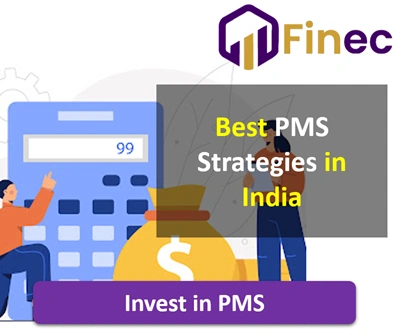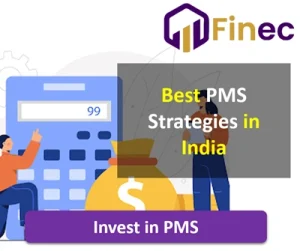The international and domestic markets are entirely unpredictable. They have experienced great fluctuations in the past few years.
Investors can’t put their most treasured time on the ever-fluctuating markets. So, Portfolio Management Services (PMS) come into the picture.
Wealthy clients typically use these services with numerous assets and an interest in investing. Portfolio managers are experts who manage customers’ portfolios.
They customize the best investment strategies based on the customer’s risk appetite and financial goals. Further, they implement appropriate investment strategies to generate wealth for the clients.
If you want to become more familiar with PMS investment strategies, read this article thoroughly. It will help you learn more about the topic. We will also dig deep into the investment strategies of PMS.
What is Portfolio Management?
Portfolio Management Service (PMS) is a financial service high-net-worth individuals use to manage their assets. Financial whizzes often become fund managers and manage customers’ assets.
With the help of a research team, portfolio managers suggest relevant investments for customers. It is no less than a challenge to manage equity portfolios for customers, so they approach professional fund managers for help.
Also, customers aim to bring more returns with less risk by employing portfolio management services.
Top Portfolio Management Strategies in India
PMS has various investment strategies. It is ideal to know these strategies in detail for future use.
Active vs Passive Management
The two most common portfolio management strategies fund managers use are active and passive investing. The ultimate goal of the active portfolio management strategy is to maximise returns.
In this method, the fund manager reduces risk. He diversifies the investments across various options. The primary advantage of this strategy is the higher turnover.
Investors or fund managers invest in indexes like NIFTY 50 in passive management. Fund managers are less likely to use passive management strategies because the portfolio managers are only slightly involved in them.
Also, the risk is lower than the active strategy, and so is the cost.
Growth vs Value Investing
In the value investing strategy, the investor or the fund manager will identify unrecognized businesses and shortlist economical stocks.
Using this strategy, investors gain huge returns when the stock market recognizes these stocks. On the other hand, growth investing involves investing in rapidly growing companies.
Under this strategy, investors target overestimated companies. Because of the hype the growth companies get, the investors invest in these companies to make quick earnings.
Related Articles
| Best PMS in India | What is Portfolio Management? |
| PMS Charges | Future of Portfolio Management |
| PMS Investment | Risk Management in PMS |
Income-Focused Strategies
As the name suggests, income-focused strategies focus on generating income for investors. Revenue is usually generated through dividends, cash flows, and interest.
Investors use these strategies to create income rather than for capital growth. The standard investment vehicles are bonds, stocks, assets, etc.
This strategy is highly employed by individuals close to retirement. Moreover, market volatility does not affect the income generated through these strategies.
Also, income-focused strategies mainly aim to preserve the capital amount. This is done by relying only on the returns generated through the capital.
Balanced and Diversified Strategies
Investors who manage their portfolios efficiently use these balanced and diversified investment strategies. Fund managers invest in diversified investment options to balance risk and return.
Investments typically include equities, bonds, and real estate. Investors combine these strategies to balance the risks of poorly performing assets.
This approach helps them achieve their financial goals more quickly and with reduced risk.
Sector and Thematic Investing
This strategy involves investing in a particular sector. For instance, the investor looks for a specific company’s stocks and invests in them.
However, these strategies could be more risky. This is because the sector may go down the hill, and so do the investments.
How to Select the Right PMS Strategy for Yourself?
There are several factors to consider while choosing the right PMS strategy.
- To choose the right PMS strategy, always start by assessing your financial goals. Determine whether you want to invest in a long-term growth plan, regular income, or both.
- You can go for high-risk investments and vice versa if you want higher returns.
- Analyze the time frame in which you want to invest your money in a particular investment vehicle. Depending on your expectations, you can invest for shorter, medium, or longer tenures.
- Search for a PMS that offers the services you need. Check the experience and expertise of its fund managers.
- Make sure the PMS you have approached offers a diverse portfolio of investments.
- Instead of making decisions, consult a financial advisor and explain your investment goals and risk tolerance. They will suggest suitable investment vehicles.
Factors Limiting Portfolio Management Strategies
Investing requires mindfulness of various factors. You must also ensure that your financial goals are met. Whether you are a novice or an expert in investing, you must explore different investment options.
This helps ensure you are taking the right investment path. Here, we are going to talk about the essential factors that are limiting investment strategies.
Risk Tolerance
In most cases, the investor may not survive a financial loss. So, risk tolerance must be highly regarded in this scenario. It is important to analyze the risk appetite before investing.
Investment Tenure
Investment tenure is another factor that can limit investment strategy. For the unversed, investment tenure is when the investment is held in the account.
The investment tenure can be short, medium, or long, depending on the investor’s feasibility.
Financial Goals
Your financial goals matter a lot. Before getting started, set your financial goals. Also, choose the investment vehicle accordingly.
You have to decide beforehand whether you want regular income, capital appreciation, or both.
Market Trends
Market fluctuations can hugely impact investments. These could limit investments as they may lead to risks. So, one must analyse the market closely before investing.
Investment Costs
Sometimes, even investment costs can limit investment strategies. So, it is essential to consider investment fees before proceeding. You must know the investment costs to avoid financial hurdles later.
Tax Considerations
Tax considerations also limit investment strategies. You must consider the tax implications if you are going for a higher investment.
The tax implications vary with the investment vehicles. You must carefully consider your investments to avoid losing your hard-earned money to taxes.
Also, make sure to understand their specific tax implications.
Liquidity
When you invest, the funds are locked for a certain period. If you need money urgently, you may be unable to withdraw them.
So, you must check the liquidity of the fund you invest in. Check your time constraints and invest in funds that align with your needs.
PMS Strategies – Conclusion
Well, this is all about the investment strategies in PMS. These strategies have been well-drafted by the PMS experts over the years.
By employing these strategies, you are highly likely to make impressive returns. Also, you are at low risk because PMS professionals create strategies based on your financial goals and risk tolerance.
Moreover, you can have your investment strategy customized by portfolio managers to meet your financial needs.






IT IS ALL ABOUT FOR YOUR STRATEGIES AND HOW YOU ENSURE INVESTORS RETURN..